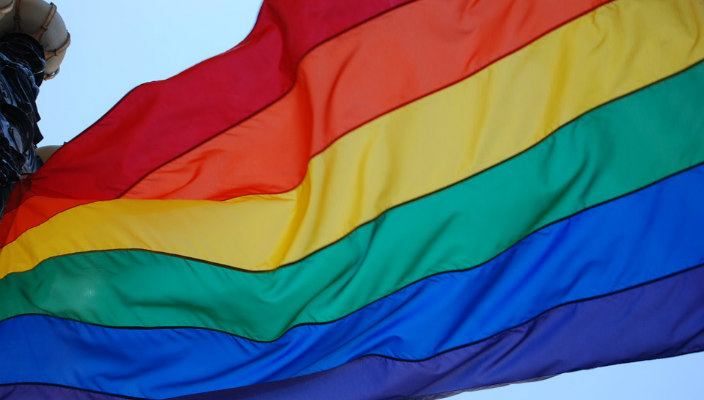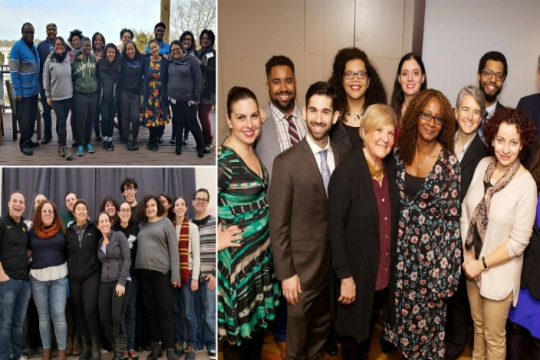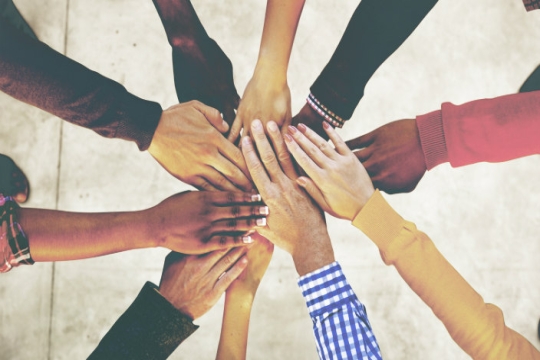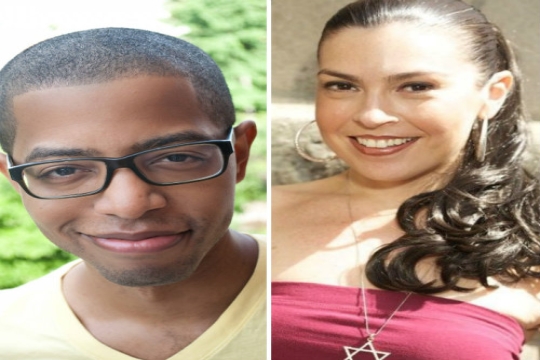
It’s June, and Pride Month is officially upon us: a time dedicated to honoring, celebrating, and learning about the diverse beauty and resilience of LGBTQIA+ history. As someone who is both Jewish and bisexual, I think a lot about how Judaism intersects with Pride, especially the way our Jewish institutions strive to cater to the needs of the LGBTQIA+ community.
The Reform Jewish Movement has taken countless strides to make our spaces audaciously hospitable to the LGBTQIA+ community, and we also know that Judaism is part of a Divine process and in a constant state of, well, reform. Therefore, as we must continue to learn about the needs of all of our members and guests and continue to expand our efforts to make our congregations and communities as welcoming as possible.
The URJ’s JewV’Nation Fellowship LGBTQIA+ Cohort is one such example of cultivating ideas from a diverse set of Jewish leaders and applying them to our institutions. In advance of Pride Month, I reached out to members of this fellowship (and one of the staffers who works with them) to gain insight into what has made them feel most welcome in Jewish spaces – and how our communities can do and be even better going forward.
Marques Hollie, 2017 JewV’Nation fellow:
“Representation matters. I can’t stress this enough. This could mean queer representation on the bimah and organizational leadership or creating programming centered around queer identity (Pride Shabbat/Shabbaton, for example). I think one of the most impactful things clergy and leaders can do is to listen to their LGBTQIA+ community members and actively invite us into conversations about creating audaciously hospitable spaces.
“Additionally, I think communities need to continually evaluate how they’re demonstrating their stated values. For example, a Pride Shabbaton once a year is fine, but if that’s the beginning and end of a community’s support for queer community, it’s time to reevaluate.
“Some of my most impactful experiences have been text study with queer Jews and being present for special blessings honoring a Jewish community’s trans members. We were all invited to come as we were to learn, study, and create sacred space – without being asked to shoehorn ourselves into specific expressions of queer identity.”
Kelly Whitehead, 2018 JewV’Nation fellow:
“I am very fortunate having worked at Temple Sinai in Washington, D.C., where there are efforts, led by Rabbi Hannah Goldstein, to make the space as inclusive as possible.
“The Multi-Racial Sinai Committee brought in speakers, hired consultants, and made book recommendations to help the community reflect on its own internal biases. By educating lay leaders and members of the intersectionality of identities, more progress is made in fighting discrimination and decreasing acts of internalized homophobia and white supremacy.
“I feel most comfortable when I know friends and allies are present in the same Jewish space as me. Even as a Jewish professional, I can find unfamiliar spaces daunting because of how my multiracial and queer identities intersect. However, our communities can become more inclusive by increasing access to all-gender restrooms, advertising offered affinity spaces, and making it a habit of introducing people with proper pronouns – starting with our campers and religious school students.”
Caroline Dorn, 2019 JewV’Nation fellow:
“I find myself most comfortable when there is visible LGBTQIA+ representation and/or media on congregations’ websites – queer families on the website, a small rainbow in the physical space, safe space stickers, etc. and when people (especially cisgender people) share their pronouns upon introducing themselves. My synagogue, Temple Shalom (Newton, MA) began providing ‘My pronouns are’ stickers, including pronouns in email signatures office-wide, hanging ‘Safe Space’ posters on doors, changing all-gendered language – and it’s been amazing!
“I like programming that is LGBTQIA+ specific; I think it’s important to have affinity spaces that are only for queer people. That said, I feel it’s great when a synagogue hosts an event about how to be a better ally to the transgender (trans) community or an introduction to trans issues. It makes these conversations accessible to those who come in with zero knowledge.
“Also, Jewish communities should be willing to say they are working and learning and not always getting it right! There is so much value to that vulnerability, and I really respect communities who don’t pretend to have it all down.”
Rachel Hall, URJ Program Manager for Audacious Hospitality:
“When I was working at a congregation, the most impactful experience for me was seeing other explicitly out members or congregation leaders present. It’s hard to believe you are queer-friendly or see value in multiracial communities if your entire staff, lay leadership, and clergy are white and straight.
With respect to being more inclusive of those of us who are LGBTQIA+, our communities should hire queer staff, run programs explicitly for queer families, use non-binary terms when collecting information, and not automatically assume someone is heterosexual or cisgender (as just a few examples). From my experience, celebrating Pride as a congregation and leaders trusting me to redesign my temple’s religious school curriculum in order to reflect our diverse membership, made me feel not only included, but conveyed to me that I was a necessary member of the community. It felt really good and assured me I was in the right place.
“My advice to Jewish communities? Ask for feedback from your members – yes, really! You can simply ask all members, ‘How can we make our community more inclusive?’ You can – and should – also download the URJ’s LGBTQ & Jews of Color Resource Module to strengthen your congregation’s work in this area and learn from other congregations who have successfully created queer-friendly communities. You don’t have to reinvent the wheel; there are so many communities to learn from.”
May Pride Month inspire us to become the most inclusive and hospitable communities possible, and may we listen to the needs of those we serve in ways that propel the Jewish community forward in incredible ways.
To continue this important and meaningful conversation, we welcome you to share your thoughts, experiences and visions in the LGBTQIA+ Tent Group.
Related Posts

Announcing the 2019 JewV’Nation Cohort: Diversity, Equity, and Inclusion

Announcing the 2019 LGBTQIA JewV’Nation Cohort!
